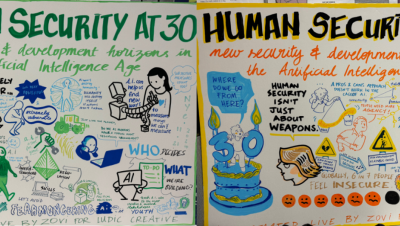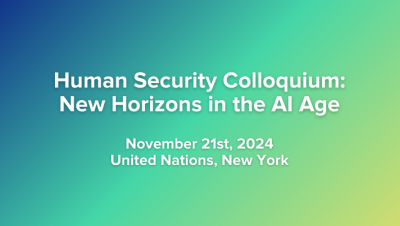In Colombia we are more determined than ever to end the longest running and only remaining internal armed conflict in the Americas.
Colombians were divided over the agreement that was negotiated between the Government and the FARC guerrillas. And so, we undertook efforts to reach a new peace accord that would dispel doubts and garner nationwide support. Almost simultaneously we announced the beginning of peace talks with the ELN, the last remaining guerrillas. We hope this will bring a definitive end to the armed conflict in our country.
For five decades the war has had a very high price for Colombia and has, undoubtedly, hurt the nation’s prospect. A study by Los Andes University estimates that households who have been victims of forced displacement and violence saw their income reduced by half. This is exacerbated when one considers that these people are likely to have difficulty recovering and are at risk of living in conditions of chronic poverty.
Beyond the effect on our economy, the greatest impact of the war falls on 250,000 or more casualties— And their families— and the 8 million victims and internally displaced people. Every life lost, as well as each and every one of the personal and family tragedies of those who were affected by the armed conflict and survived, both saddens us and also strengthens our commitment.
We agree with the spirit of this Human Development Report, which is that the “wealth of human lives” must be considered before the wealth of economies when judging the prosperity of society. In that sense we understand that peace is a basic condition for enriching the lives of Colombians. And I am referring to a broader concept of peace that transcends the end of the conflict and brings harmony and well-being.
A family with insufficient income does not live in peace, nor does a family without decent housing or access to education. This is why we have focused on fostering economic growth that benefits everyone and that reduces social gaps.
The progress we have made to date is in line with the Sustainable Development Goals that Colombia championed and began working towards, even before they were adopted by the United Nations. Indeed, we were the first country to include these goals in our National Development Plan.
Thanks to our early efforts, we have been able to reap the benefits of our work ahead of schedule. For example, over the past five years we have reduced extreme poverty by nearly half— From 14.4 percent to 7.9 percent— a very significant achievement that allows us to envisage its eradication by 2025, if not sooner.
That jump, beyond the numbers, means that millions of Colombians have improved their quality of life. We are certain of this because, together with traditional income-based measures of poverty, we have pioneered the Multidimensional Poverty Index, which assesses other variables, such as access to public services or the type of family housing. Today, without a doubt,
more Colombians have a better life.
We have also made early progress in the quality of education— Another of the Sustainable Development Goals. Not only do all children and young people study in public schools for free, we are increasing their class hours and improving the quality of learning through different programmes and initiatives. As a result of these efforts, our students have significantly improved the average scores on tests that measure their knowledge and skills.
With our focus on peacebuilding, the emphasis on education is perhaps the best example of what we can do in this new phase without the burden of the armed conflict. For the first time ever, the education budget is greater than that for security and defence, which is consistent with our goal to become the most educated country in Latin America by the year 2025. Peace, equity and education are three areas that Colombians have been deprived of historically.
Peace, equity and education have been the three pillars of our main efforts over the past few years.
However, if our goal is to achieve “human development for everyone,” our efforts cannot stop here: Climate change is the greatest threat ever faced by humankind.
In this regard Colombia has decided to play an active part in tackling this phenomenon. As guardians of one of the most biodiverse regions on the planet, with exceptional forests, water resources and soil fertility, we have an enormous responsibility to both Colombians and the world.
The concept of “green growth” is part of our economic development model and has been mainstreamed into all sectors of the economy. We are convinced that growth and environmental sustainability are perfectly compatible. In addition, the demarcation of our paramos (moorland ecosystems) and the declaration of protected areas— which by 2018 should reach 19 million hectares, an area larger than Uruguay— are proof of our resolve.
Under the Paris Agreement on climate change, Colombia has set out a goal: to reduce projected greenhouse gas emissions by 20 percent by 2030. And we have already begun to take decisive action to achieve this ambitious objective: We have presented a bill to Congress for the creation of a carbon tax on various fuels. We will be the first Latin American country— And one of the first in the world— to apply such a measure. With this single initiative we expect to meet half of our commitment established in the Paris Climate Change Conference.
Peace— understood, as I mentioned before, in the broader sense of well-being and harmony— opens the door to the possibility of a viable world for future generations, one in which their very existence is not threatened by global warming. We are proud to confirm that these efforts, in addition to the end of the armed conflict, improved education and increased equity, are a contribution to the world.
With the end to the conflict, people from around the globe can enjoy the natural wonders and tourism in Colombia, which had been restricted for decades— even for Colombians themselves. Also, foreign business people can discover new opportunities in sectors and regions that were previously off limits because of violence.
In terms of equity we are strengthening the middle class that will create an opportunity for investors in search of new markets. And with quality education we are preparing a new generation that in the future will be able to put its skills and knowledge into practice anywhere in the world.
“Human development for everyone” is a commitment that transcends our country, and we want our work to impact and enrich the lives of citizens from other nations. Similarly, we feel that the support of the international community has had a positive impact on Colombians. We are convinced that, in a spirit of solidarity and collaboration, we will continue working together, Colombians and non-Colombians, to build peace in Colombia and peace for the rest of the world.
This text was originally published in the Human Development Report 2016 “Human Development for Everyone”. Please see special contribution on page 20.
The HDialogue blog is a platform for debate and discussion. Posts reflect the views of respective authors in their individual capacities and not the views of UNDP/HDRO.
HDRO encourages reflections on the HDialogue contributions. The office posts comments that support a constructive dialogue on policy options for advancing human development and are formulated respectful of other, potentially differing views. The office reserves the right to contain contributions that appear divisive.
Photo: CHALK4PEACE


